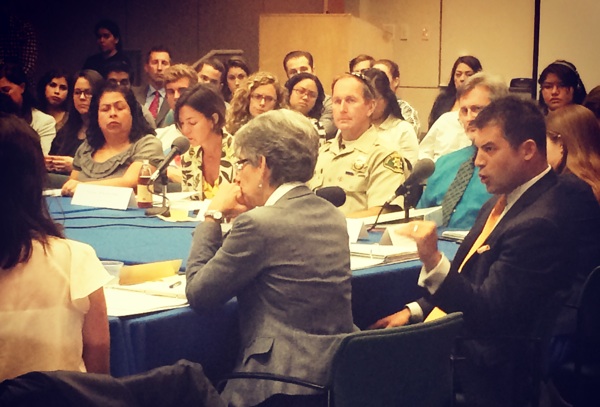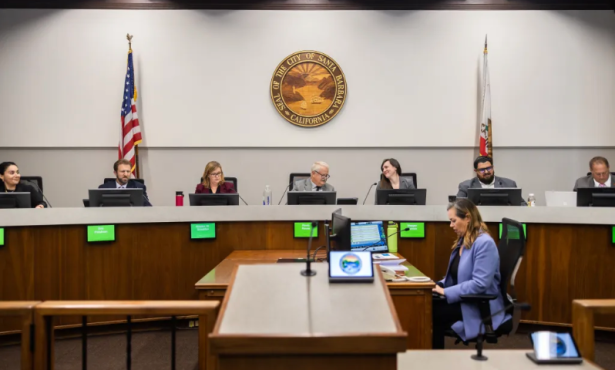Talking Sexual Assault at UCSB
Crowd Blinks at Disparity Between Assaults Reported and Adjudicated

A room in UCSB’s engineering building was packed on Wednesday with people who came to hear a roundtable discussion about sexual violence and the college’s response to it. The two-hour event was held relatively soon after a federal complaint signed by six people was filed against UCSB for its handling of sexual assault investigations. At the table were representatives from UCSB’s Office of Judicial Affairs, UCSB’s advocacy and resource offices (known as CARE), S.B. City College, Santa Barbara Rape Crisis Center as well as survivors and involved students.
The issue of sexual violence on college campuses has become a hot topic in the past year, spurred by media reports and an abundance of online accounts, many that detailed experiences of young women who claim they were victimized twice: first by their perpetrator and again by their universities for sweeping their cases under the rug.
The latter was a key topic on Wednesday, as Assemblymember Das Williams and State Senator Hannah-Beth Jackson pressed administrators about their responses to reports of sexual assaults on campus and in Isla Vista. Williams was particularly taken aback by the numbers, which indicated that about 60-70 students sought assistance at CARE annually in the past few years. (Roughly half the perpetrators are either unknown or not UCSB students). About 10 cases were referred to Judicial Affair offices for review each year. Just one or none were disciplined, which, Williams emphasized, is only suspension for one to three quarters. (Also, a few students withdrew in the past four years after being charged.)
Campus administrators stressed the low numbers are in part because survivors are able to decide whether or not to move forward with a case — through Judicial Affairs or law enforcement. They added that for cases that do get sent to Judicial Affairs, the evidence is sometimes not strong enough to adjudicate a case.
“None of this okay,” acknowledged Angela Andrade, associate dean for Student Wellness Services. Andrade added that the law that Jackson co-authored, commonly referred to as “yes means yes,” may be a useful tool in adjudicating cases in the future. The new law comes into effect January 1, and requires that colleges update their campus policies so that specific affirmative consent is defined as the standard in campus policies.
The conversation circled back more than once to the fact that UCSB does not have the ability to discipline nonstudents, even though some may be SBCC students who plan to transfer to UCSB. With that, Jackson postulated, “If I’m a person from the community, I can basically behave with relative impunity [in Isla Vista] … It doesn’t seem like there’s much accountability.”
Current UCSB policy states that students who are convicted of serious crimes such as sexual assault off campus can be subject to sanctions from the university, though few are handed down each year. According to UCSB spokesperson George Foulsham, the university is aware that concerns have been raised about some of the school’s processes. “We are always actively reviewing our processes to strengthen our response and to implement best practices when it comes to addressing sexual violence,” Foulsham said in an email.
The positive news is that UCSB has stepped up its prevention and advocacy efforts through its CARE offices, which received a $300,000 federal grant in 2012 to hire additional staff and expand its outreach education programs. CARE offices serve as a one-stop center where students can find coordinated services for the care they need after experiencing interpersonal violence. Further, a designated UC Police Department detective specifically trained in responding to sexual violence will be assigned to work with CARE.
The sentiment of increased resources on campus was iterated on Wednesday by a student named Katie (who did not want to divulge her last name), who said her experience with CARE was “entirely positive.” She went on to say her interaction with the Isla Vista Foot Patrol was troubling because she said she was discouraged from taking a forensic “rape kit.”
Lieutenant Brad McVay said that he was not familiar with her particular case and that rape kits are very useful for law enforcement. McVay added that he would not “sugarcoat” what the survivor must go through during an investigation, which involves reliving the experience in detail with the investigating officer. Further, any time alcohol is part of the equation — which is often — the case is more difficult to prove beyond a reasonable doubt to a jury.
Also at the table was Ben Partee, a City College dean, who explained that the security department handles sexual assault reports, and the college works with police and sheriffs’ departments when a student violates the code of conduct. Partee emphasized that the state education code is clear about where their jurisdiction ends — something Williams observed could possibly be changed through the Legislature. Partee said, “It’s our hope that we can help eliminate assaults on the rise in Isla Vista.”
Another voice came from Elsa Granados, executive director of the Rape Crisis Center, who spoke about the fact that people are not educated about the myths surrounding sexual assault — i.e., that clothing choices or alcohol consumed contribute to assault. “Until we help alleviate the stigma,” said Granados. “Survivors are not going to come forward.” Half of the rape crisis centers in the state have lost funding, she added. “It’s atrocious.”
Following the discussion, Williams said, “I hope that they make the adjustments internally to adequately be able to enforce campus policies concerning rape, and if they don’t I will keep on showing their lack of progress.”



